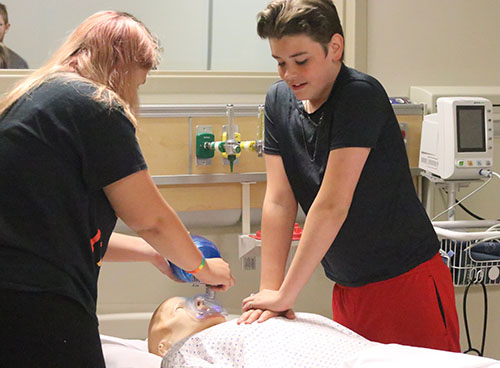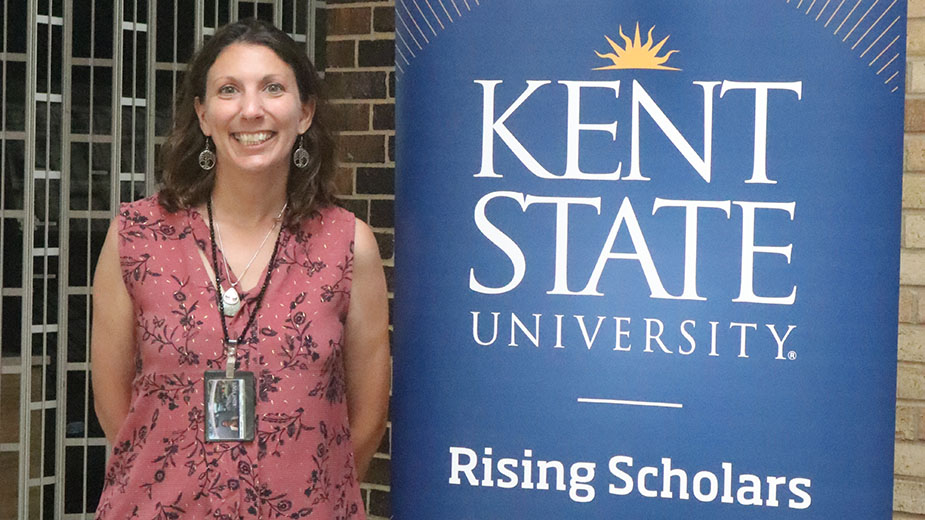SALEM, Ohio – Rising Scholar students resuscitated a struggling simulator patient in the Kent State Salem nursing lab, only days after defusing virtual bombs.
The promising young minds are getting a chance to excel through the Rising Scholars program at Kent State University’s regional campuses.
Through the program, students are encouraged to consider and dream about a future beyond what they might have once thought possible. Then they are given some resources and guidance to help them navigate their chosen paths.
Dr. Jessica Paull, program coordinator at KSU’s regional campuses in Columbiana County, says Rising Scholars has had a high rate of success, with students in the program outperforming their peers in just about every category. “I’m very proud with what we’ve been able to accomplish,” she says.
Originally called Rural Scholars, Dr. David Dees founded the program in 2012. Dees served as the dean at the KSU campuses in Salem and East Liverpool.
Students, who would be first-generation college students if they choose that path, are given a chance to learn more about their interests and what it takes to succeed.
The students attend group events and work with a college-age mentor, who can guide them toward chosen career paths, whether that includes attending college, a trade school, the military or going directly into the workplace.
A guidance counselor or teacher nominates students for the program following their sixth-grade year. They are required to write an essay, with the program accepting three or four students from each of the schools in Columbiana County.
Possibly living below the poverty line, these students are considered to have potential as high performing students.
“Our goal is to help students find their interests, find their niche,” Paull says. “We help them find what they’re good at, something they are passionate about, and then support them.”
What began with 12 students from only a few schools a decade ago has grown to 130 students.
Kent State University student Blaine McCurdy was once a Rising Scholar himself. Now he is one of the mentors helping younger students.
“It’s very weird to see it from the other side,” says McCurdy, who also follows up with the students when they graduate from high school and the program.
For the first two years after graduation, McCurdy touches base with the students and finds them resources if they need them. He can help them find information about other options, if they later decide the path they took was not the right one.
McCurdy also can help students prepare for a job interview, write resumes and obtain references.
“I invite anyone who wants to be a part of it to get involved,” Paull says.
The Kent State student mentors earn money and scholarships, as well as gain valuable skills in working with others, she notes.
Besides working with mentors, the students selected for the program from seventh grade through 12th grade attend 10 to 12 annual workshops geared toward their individual interests.
Students and parents receive help in how to locate scholarships and navigate the Free Application for Federal Student Aid (FAFSA), which can be daunting for first-time applicants.
Students and their friends can also participate in fun events, such as movie nights at the Kent State regional campuses.
REAL WORLD EXPERIENCE
During the summer, students participate in a theme-week by grade level.
Students who will be in eighth grade recently attended workshops with the theme of “Risky Business” that were geared toward helping them to learn about community care and risk assessment. They spent a day at the Forensics Science Club at Youngstown State University, learning about crime scenes and how to test for blood. Students explored a virtual reality escape room, and defused virtual bombs.
At the East Liverpool Police Museum, students gained historical knowledge of what shaped the former pottery town. Yet another day took them behind the scenes at the Counseling Center of Columbiana County in Lisbon.

The last day of the week was spent with instructors from KSU’s nursing program at the Salem campus. Students got to work with simulator dummies, which blink, moan, convulse, struggle with breathing and go into cardiac arrest.
While working in groups, students brainstormed and took action toward reviving the patient.
As the students were having fun, Lorene Martin, Salem program coordinator for the baccalaureate in nursing program, says they were also learning about what it means to be a nurse and the variety of places where nurses work.
“It’s always great to get these kids thinking about it [because] we need nurses,” Martin says. “We are breaking the mold. Students think [nurses] wear white and [just] listen to doctors. They do so much more.”
Paull notes they have many options and the program allows students to explore when their grades don’t depend on it.
During COVID, Martin says, some of the students graduating from the Kent State baccalaureate program took contracts to help in other places – perhaps cities they had never visited – and it opened the doors to what life is like away from Columbiana County.
Some ended up staying after their contracts expired while others returned. But it gave them a chance to explore an urban lifestyle. Others learned that nurses fly on life flights, helping the most critical patients on the way to receiving medical care.
“We just open the door and let them see what kinds of opportunities there are,” Martin says.
Different age groups participate in different themed weeks.
This summer, some students will spend time at manufacturing plants such as Butech Bliss and Ventra in Salem, as well as with Westfield Insurance near Akron. Older students will help Habitat for Humanity members as they build houses.
“We love working with local businesses,” Paull says. “We always want to find new opportunities.”
For example, YoFresh of Canfield has partnered with the program. Students have gone there to learn about food preparation and running a small business firsthand from chefs Don and Caroline Ritenour, while YoFresh has delivered lunches for student gatherings.
By connecting students with nearby companies and their owners, Paull points out, the students may later seek employment and already have networking opportunities.
Students in the 11th grade are encouraged to spend a week at the Kent State University campus, attend classes and participate at the recreation center.
Even if the students choose not to go to Kent State University, the regional campuses or any college, Paull says the program supports them in whatever careers they choose.
As such, Rising Scholars is looking at creating an apprenticeship option for students interested in learning a trade.
With a decade’s worth of Columbiana County students attending the program, its success is being duplicated at other regional Kent State campuses – Ashtabula, Geauga, Stark, Trumbull, Tuscarawas and Twinsburg. The goal of the program is to help 700 students a year take advantage of the opportunities available.
PROGRAM RISING AT TRUMBULL
At Kent State Trumbull, a Rising Scholars program is in the early stages.
Tiffany Tyree, a coordinator for career planning with Kent State University, serves as the program coordinator for the Rising Scholars program at the campus in Champion Township.
The students in the Trumbull program are in grades nine through 12 and also participate in the Inspiring Minds program of Warren.
Besides focusing on career and college readiness, Tyree says those in the Rising Scholars program at Trumbull focus on developing their identities and exploring cultural diversity. At the moment, participants in the Trumbull program are mostly African American and first-generation students.
“As they move forward in life, they really have to have a good sense of who they are, what their Black identity represents to them, as well as be able to connect and meet people that look different than them,” Tyree says. [Understanding] “differences and similarities will help their growth as they continue on in their journey.”
Students also participate in workshops and presentations. In the summer, students in the Trumbull program are encouraged to try internships or take a three-credit college course that they can later transfer.
The Trumbull campus program began the spring before COVID-19 struck. So it had a slow start and remains relatively new.
Tyree wants to hire more mentors for the Rising Scholars as well as college-age students interested in supporting special populations or working with children. Then the program may expand to include students in seventh and eighth grades, she says.
Pictured at top: Jessica Paull is director of the Rising Scholars program in Columbiana County.
